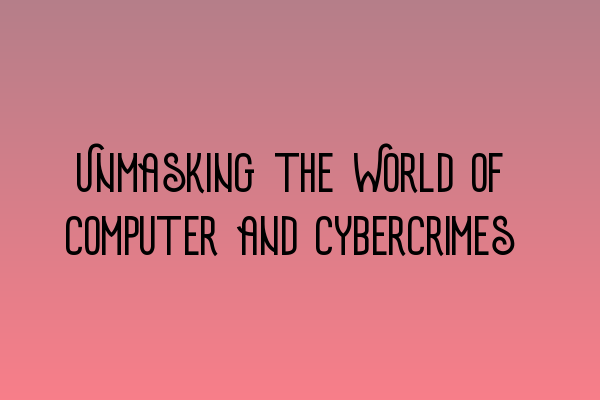Unmasking the World of Computer and Cybercrimes
With the rapid advancement of technology, the world has become more interconnected than ever before. While this connectivity brings numerous benefits, it also opens the door to a new breed of criminals – computer and cybercriminals. In this article, we will delve into the depths of this digital underworld, exposing the techniques and consequences of computer and cybercrimes.
The Growing Threat of Cybercrimes
As more and more aspects of our lives are being digitized, the threat of cybercrimes looms larger than ever. From hacking and identity theft to phishing scams and ransomware attacks, cybercriminals are constantly evolving their tactics to exploit vulnerabilities in our digital infrastructure. The ramifications of these crimes can be devastating, both financially and emotionally.
According to recent reports, the number of cybercrimes has skyrocketed in recent years, costing individuals and businesses billions of pounds annually. It is crucial for individuals and organizations to understand the risks and take necessary precautions to protect themselves from falling victim to these malicious acts.
Types of Computer and Cybercrimes
Computer and cybercrimes encompass a wide range of illegal activities conducted through digital channels. Some common types of cybercrimes include:
- Hacking: Unauthorized access to computer systems or networks.
- Identity Theft: Stealing someone’s personal information to impersonate them.
- Phishing: Fraudulent attempts to obtain sensitive information, such as usernames and passwords, by disguising as a trustworthy entity.
- Ransomware Attacks: Holding a victim’s computer or data hostage in exchange for a ransom.
- Malware and Virus Distribution: Intentionally spreading malicious software to disrupt or damage computer systems.
These are just a few examples of the many computer and cybercrimes that exist today. It’s important to stay informed and vigilant to protect yourself and your organization from these threats.
The Legal Framework and Consequences
In the UK, computer and cybercrimes are governed by various laws and regulations, including the Computer Misuse Act 1990 and the Data Protection Act 2018. These laws provide the legal framework for prosecuting individuals involved in these illegal activities.
If convicted of a computer or cybercrime, the penalties can be severe. Offenders may face hefty fines, imprisonment, or both, depending on the nature and severity of the crime. It is crucial for law enforcement agencies and legal professionals to stay updated on the latest developments in this ever-evolving field to effectively combat these crimes.
Protecting Yourself from Computer and Cybercrimes
While the threat of computer and cybercrimes may seem daunting, there are steps you can take to protect yourself and your organization:
- Use Strong and Unique Passwords: Create complex passwords that are difficult to guess and avoid reusing passwords across multiple accounts.
- Enable Two-Factor Authentication: Add an extra layer of security to your accounts by enabling two-factor authentication whenever possible.
- Keep Software Updated: Regularly update your operating systems, antivirus software, and other programs to patch any vulnerabilities.
- Be Cautious of Suspicious Emails and Links: Exercise caution when opening emails or clicking on links from unknown sources, as they may contain phishing attempts or malware.
- Backup Your Data: Regularly backup your important files and data to an external device or cloud storage to minimize the impact of a ransomware attack.
- Invest in Cybersecurity Measures: Consider investing in robust cybersecurity solutions, such as firewalls, intrusion detection systems, and encryption tools.
By following these best practices, you can significantly reduce the risk of falling victim to computer and cybercrimes.
Conclusion
The world of computer and cybercrimes is complex and ever-changing. As technology advances, so do the techniques employed by cybercriminals. It is crucial for individuals, organizations, and legal professionals to stay informed and proactive in combating these threats. By understanding the types of computer and cybercrimes, the legal framework surrounding them, and implementing preventive measures, we can collectively work towards a safer digital landscape.
For more information on related legal topics, please check out these articles:
- SQE Exam Prep: Essential Study Materials for Aspiring Solicitors
- Demystifying the Solicitors Qualifying Examination Format
- LLC Formation Made Simple: Step-by-Step Guide for UK Entrepreneurs
- LLC Formation: A Step-by-Step Guide for UK Entrepreneurs
- Business Regulations in the UK: A Comprehensive Overview
